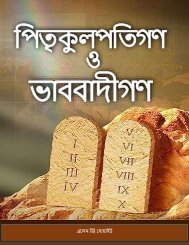Finishing the Race
Of all the games instituted among the Greeks and the Romans, the races were the most ancient and the most highly esteemed … The contests were governed by strict regulations, from which there was no appeal. Those who desired their names entered as competitors for the prize had first to undergo a severe preparatory training. Harmful indulgence of appetite, or any other gratification that would lower mental or physical vigour, was strictly forbidden. For one to have any hope of success in these trials of strength and speed, the muscles must be strong and supple, and the nerves well under control. Every movement must be certain, every step swift and unswerving; the physical powers must reach the highest mark.
Of all the games instituted among the Greeks and the Romans, the races were the most ancient and the most highly esteemed … The contests were governed by strict regulations, from which there was no appeal. Those who desired their names entered as competitors for the prize had first to undergo a severe preparatory training. Harmful indulgence of appetite, or any other gratification that would lower mental or physical vigour, was strictly forbidden. For one to have any hope of success in these trials of strength and speed, the muscles must be strong and supple, and the nerves well under control. Every movement must be certain, every step swift and unswerving; the physical powers must reach the highest mark.
Create successful ePaper yourself
Turn your PDF publications into a flip-book with our unique Google optimized e-Paper software.
"Ano<strong>the</strong>r kind of evidence that vitally affected my mind," he says, "was <strong>the</strong> chronology<br />
of <strong>the</strong> Scriptures. . . . I found that predicted events, which had been fulfilled in <strong>the</strong> past,<br />
often occurred within a given time. The one hundred and twenty years to <strong>the</strong> flood (Genesis<br />
6:3); <strong>the</strong> seven days that were to precede it, with forty days of predicted rain (Genesis 7:4);<br />
<strong>the</strong> four hundred years of <strong>the</strong> sojourn of Abraham's seed (Genesis 15:13); <strong>the</strong> three days of<br />
<strong>the</strong> butler's and baker's dreams (Genesis 40:12-20); <strong>the</strong> seven years of Pharaoh's (Genesis<br />
41:28-54); <strong>the</strong> forty years in <strong>the</strong> wilderness (Numbers 14:34); <strong>the</strong> three and a half years of<br />
famine (1 Kings 17:1) [see Luke 4:25;] . . . <strong>the</strong> seventy years' captivity (Jeremiah 25:11);<br />
Nebuchadnezzar's seven times (Daniel 4:13-16); and <strong>the</strong> seven weeks, threescore and two<br />
weeks, and <strong>the</strong> one week, making seventy weeks, determined upon <strong>the</strong> Jews (Daniel 9:24-<br />
27),--<strong>the</strong> events limited by <strong>the</strong>se times were all once only a matter of prophecy, and were<br />
fulfilled in accordance with <strong>the</strong> predictions."--Bliss, pages 74, 75.<br />
When, <strong>the</strong>refore, he found, in his study of <strong>the</strong> Bible, various chronological periods that,<br />
according to his understanding of <strong>the</strong>m, extended to <strong>the</strong> second coming of Christ, he could<br />
not but regard <strong>the</strong>m as <strong>the</strong> "times before appointed," which God had revealed unto His<br />
servants. "The secret things," says Moses, "belong unto <strong>the</strong> Lord our God: but those things<br />
which are revealed belong unto us and to our children forever;" and <strong>the</strong> Lord declares by <strong>the</strong><br />
prophet Amos, that He "will do nothing, but He revealeth His secret unto His servants <strong>the</strong><br />
prophets." Deuteronomy 29:29; Amos 3:7. The students of God's word may, <strong>the</strong>n,<br />
confidently expect to find <strong>the</strong> most stupendous event to take place in human history clearly<br />
pointed out in <strong>the</strong> Scriptures of truth.<br />
"As I was fully convinced," says Miller, "that all Scripture given by inspiration of God is<br />
profitable (2 Timothy 3:16); that it came not at any time by <strong>the</strong> will of man, but was written<br />
as holy men were moved by <strong>the</strong> Holy Ghost (2 Peter 1:21), and was written 'for our<br />
learning, that we through patience and comfort of <strong>the</strong> Scriptures might have hope' (Romans<br />
15:4), I could but regard <strong>the</strong> chronological portions of <strong>the</strong> Bible as being as much a portion<br />
of <strong>the</strong> word of God, and as much entitled to our serious consideration, as any o<strong>the</strong>r portion<br />
of <strong>the</strong> Scriptures. I <strong>the</strong>refore felt that in endeavouring to comprehend what God had in His<br />
mercy seen fit to reveal to us, I had no right to pass over <strong>the</strong> prophetic periods."-- Bliss,<br />
page 75.<br />
The prophecy which seemed most clearly to reveal <strong>the</strong> time of <strong>the</strong> second advent was<br />
that of Daniel 8:14: "Unto two thousand and three hundred days; <strong>the</strong>n shall <strong>the</strong> sanctuary be<br />
cleansed." Following his rule of making Scripture its own interpreter, Miller learned that a<br />
day in symbolic prophecy represents a year (Numbers 14:34; Ezekiel 4:6); he saw that <strong>the</strong><br />
period of 2300 prophetic days, or literal years, would extend far beyond <strong>the</strong> close of <strong>the</strong><br />
Jewish dispensation, hence it could not refer to <strong>the</strong> sanctuary of that dispensation. Miller<br />
accepted <strong>the</strong> generally received view that in <strong>the</strong> Christian age <strong>the</strong> earth is <strong>the</strong> sanctuary, and<br />
he <strong>the</strong>refore understood that <strong>the</strong> cleansing of <strong>the</strong> sanctuary foretold in Daniel 8:14<br />
represented <strong>the</strong> purification of <strong>the</strong> earth by fire at <strong>the</strong> second coming of Christ. If, <strong>the</strong>n, <strong>the</strong><br />
199


















